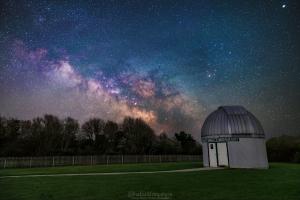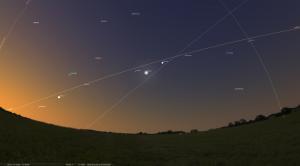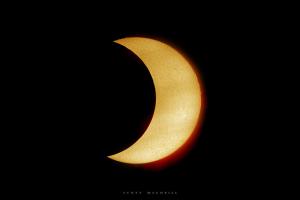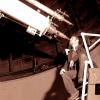Celebration of Space - June 24, 2022
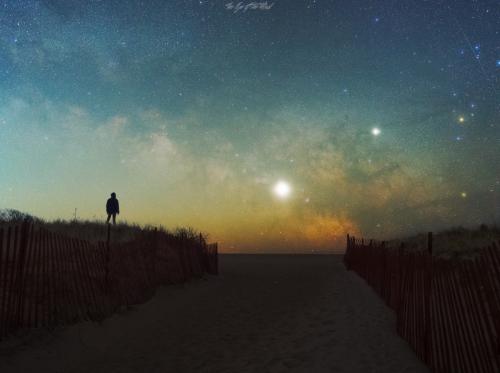
The Milky Way rises over the Ninigret National Wildlife Refuge by Frosty Drew Astronomy Team member, James Crouch.
Tomorrow night, Saturday, June 25, 2022, from 9:30 pm – 12:30 am, Frosty Drew Observatory and Science Center will host our first Celebrate the Milky Way event of summer 2022. These are the nights that we think visitors will get the best view of the Milky Way stretching over our location on a Saturday night during Milky Way viewing season. One of the questions we hear the most at Frosty Drew is “When can I see the Milky Way?” Being in the Northeast, most of us have not seen the Milky Way due to excessive (and unnecessary) light pollution in the region. At Frosty Drew, we have a great view of the Milky Way, but seeing it is not as easy as just showing up. We need to have clear sky conditions, and CLEAR! Too hazy, foggy, or cloudy, and it just won’t cut it. Timings also matter as the Milky Way needs to get high enough in the sky to see. We also need the Moon to be well below the horizon, as any moonlight will obscure the view.
The idea of Celebrate the Milky Way came about one afternoon in Sharon, MA when Frosty Drew Astronomy Team members Brian and Scott met up at a cafe to discuss the addition of new special events. They had laid out the most frequently asked questions and Brian suggested that we build out events that bring answers to those questions, specifically, viewing the Milky Way. Scott brought up questions we get about aliens… The event was largely laid out on a napkin and the rest is history. Celebrate the Milky Way has become one of our most popular summertime events, and for good reason. On these nights we do not set up the lunar lounge, or open the Science Center. We also reduce our use of red lights. The reason – to keep everyone as dark adapted as possible. This year we also integrated better shielding of headlights from the parking lot into the Courtyard area. All with the goal of bringing better views of the Milky Way to you. So make plans to come out tomorrow night and celebrate the Milky Way at the darkest site in Rhode Island. Info and tickets can be acquired here.
This coming Tuesday, June 28, 2022 at 10:53 pm ET, the June New Moon will occur. Unlike the monthly full moons, the new moon does not get a name, and is called either the New Moon or Conjunction. The reason it is difficult to observe the new moon is because the Moon arrives in between the Sun and Earth in its orbit. This will place the opposite side of the Moon in direct sunlight, with the side facing Earth in darkness. Additionally, the new moon will rise and set with the Sun, placing the Moon into the daytime sky only. Observing the new moon is possible, but it is difficult and dangerous as you risk letting damaging sunlight into your eyes. The new moon is a great time for astronomy, especially at locations like Frosty Drew, where it is very dark. This is because the Moon is not out for the entire nighttime period allowing for a full night of super dark sky conditions. Additionally, the nights around the new moon are also pretty much equally excellent because the Moon rises or sets during twilight.
The morning parade of the planets continues, and we are in a period of fantastic viewing right now! Over the last week I have heard much hype about the rare planetary alignment, including receiving a few nasty-grams about why Frosty Drew is not open for the alignment of the century, all of which are not true. Regardless of what you have heard, the view is quite nice, and well worth a trip out to the coast along Narragansett Bay. The conjunction of the planets has been ongoing since the beginning of the year, and will continue well into the autumn. Though Mercury will not always be part of the conjunction, due to its relatively fast orbital period (88 days). Currently Mercury is taking part in the conjunction, and so is the waxing gibbous Moon. To catch a view of the conjunction, tomorrow morning or Sunday morning will be quite the opportunity as long as fog is not a problem. Set out to a location like Point Judith or Beavertail. You will need to be at a spot with a very low view of the ENE horizon. Make sure you are there for 4:00 am. Starting about 4:15 am, look to the ENE horizon. You will notice the super thin crescent Moon, which will either be to the west of Venus on Saturday, or just next to Venus on Sunday, lower and to the east of Venus is Mercury. Going the other direction, along the ecliptic (the path the Sun takes across the sky) you will run into Mars over the ESE, then Jupiter, and finally Saturn in the south sky.
For those wondering why Frosty Drew has not been opening for the [insert adjective you have heard] event, there are a few reasons. One, Ninigret Park, home to Frosty Drew has some locations that will offer a good view, but not where Frosty Drew Observatory and Science Center is located. Viewers would do much better to visit a location along the western shore of the Narragansett Bay. Secondly, this event is happening in the pre-dawn hours before sunrise, and we really do not think we would have any visitors. Our basis for this was the June 10, 2021 annular solar eclipse, which happened at 5:30 am. This was the most the Sun has been eclipsed over our region in decades. We had expected there to be hundreds, if not thousands, of people present to observe. The location I was at, which was probably the best spot to be in all of Rhode Island, had only one other person aside from myself. If this was happening in the evening hours, we would certainly host events for viewing, but in the morning, visitors just don’t trek out. Regardless, it is worth a view and the spots listed above will be fantastic for viewing the parade.
- Author:
- Scott MacNeill
- Entry Date:
- Jun 24, 2022
- Published Under:
- Scott MacNeill's Columns

